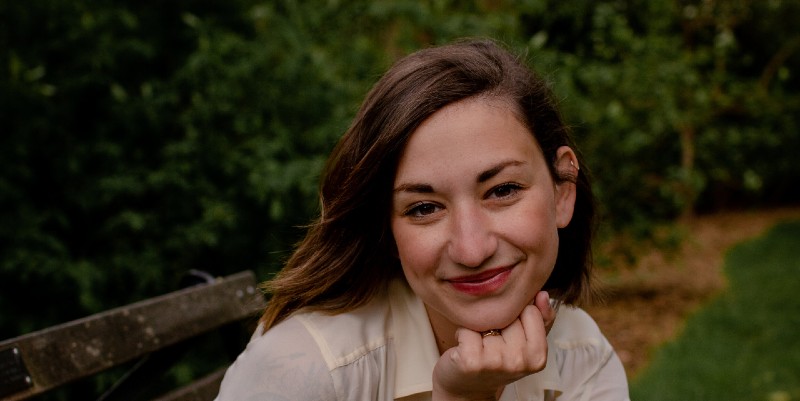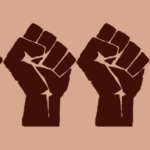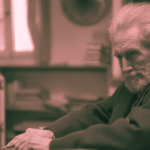Danya Kukafka is the nationally bestselling author of Girl in Snow and Notes on an Execution.
I first met Danya a few months back at the Edgars. It was a brief, two-ships-passing-in-the-night sort of moment. Danya had just had her picture taken in front of the Poe-themed backdrop, and I was next in line. We smiled. We nodded. That was it.
But then, a few hours later, Danya was up on stage, giving a supremely moving speech as she accepted the Edgar for “Best Novel.”
I was already a huge fan of her sophomore book Notes on an Execution (seriously, if you haven’t read this, it’s a genre-bending, transcendent masterpiece), but that speech, the message she delivered — it made me even more curious.
I wanted to know how this woman thought, how she worked, where she worked, if she’d had to sell her soul to write such inventive prose.
I was not disappointed, but I was at little spooked, especially at first…
Eli Cranor: The door behind you, it just swung shut. Did you see that?
Danya Kukafka: Yeah, we have ghosts. This house was built in 1914.
EC: There’s really nobody back there?
DK: Nope. Just me and my dog.
EC: A haunted house. Okay, yeah. That makes sense, but it’s not the best segue into the start of this interview. Anyway, I like to begin these things by asking how you got started writing.
DK: Do you remember the show, Reading Rainbow?
EC: Of course.
DK: Well, I submitted a book to them when I was in third grade. I really wanted to win that contest, but I didn’t. After that, I was constantly writing. I wrote three novels in high school. I queried agents. I got a couple of requests for manuscripts. I remember I went and shook my dad awake. I was like, “Dad! Dad! Look! The agent wants to read my book.” And he was like, “What?” Thankfully, all those agents passed. Those books were not meant to be published. So, yeah, I wrote three books before Girl In Snow was picked up. That whole experience showed me I could get to the end of a story. I realized I could do it, that I wanted to do it over and over again. All of that practicing and whittling away at it, was really helpful for me.
EC: And you were in the publishing world pretty early, right? Like before your first book came out?
DK: I went to NYU. I was in New York. I was doing internships with publishing houses from the time I started college and all the way through. So, yeah, I’ve always been doing book publishing alongside my writing, and I still am. I now work as a literary agent for Trellis Literary Management.
EC: Have you ever wanted to just write full time and leave the industry side of things behind?
DK: I did leave publishing to write Notes on an Execution, and that was the most miserable I’ve ever been.
EC: Miserable? Why?
DK: There were a couple of different factors. My first book performed pretty well, but not like crazy well. There was a lot of pressure on whether I’d be able to sell a second book. How much money would I make on the second book? How well would it do after the track of the first one? Writing a second book is uniquely difficult. I’m on my third now, and I’m like, Oh, this is a breeze. Or I guess I should say it’s emotionally easier. It feels easier because it’s not that huge can-you-do-it-again pressure. Anyway, I knew I had to write a second book, so I quit my publishing job. I was working as an editor at Penguin Random House. I didn’t want to always wonder what it would’ve been like to write full time. My husband got into law school. We moved from New York to Seattle. I didn’t really know anybody. I came out here and was like, I’m gonna write my second book! And then proceeded to just punch myself in the face for at least a year. I wrote a draft of a book. I gave it to my agent. She hated it. Told me to basically throw it out, which I did. This was about six months into writing full time. That was horrific. I’d put everything into this thing, but it wasn’t working. I didn’t have any other alternatives, so I started over. And it was that second draft that ended up becoming Notes on an Execution.
EC: Jesus . . .
DK: Right? After that, I’ve slowly worked my way into becoming a literary agent. It’s much more flexible than my editorial career. Agenting, strangely enough, has turned out to be the solution.
EC: That’s so interesting. There’s really something to be said for having a counterweight. Like something to balance out your writing life and your life life.
DK: Yeah. For me, it’s more of an emotional counterweight than anything else. Just like knowing that my writing can still be fun. Not everything is riding on it. I still have my other career. I have people who count on me. I have calls to take and important meetings. It’s not just me banging my head against the wall. I mean, I can bang my head against the wall when I want. I’ve left that space open for myself, but it doesn’t have to happen like it did for my second novel.
EC: And there’s only so many hours in a day, right? So many creative hours, especially.
DK: That was my exact problem. I would sit there for four hours in the morning. I’d hit a wall, be totally exhausted, look up and be like, Oh my god! My husband didn’t get home from school for another five hours. I didn’t even have a dog yet. What was I supposed to do with myself? I felt like I was using sixty percent of my brain.
EC: Let’s get into your process. You get that first seed of an idea, what do you do?
DK: I just think about it for like years. I just keep sitting on it and letting it grow. What’s weird, I don’t think I’ve ever thrown out an idea. If it’s not working, I just twist it, then twist it some more, until it’s almost unrecognizable, but it always comes from the same thing.
EC: Do you have an idea bank? I have a spot on my wall where I write “Novel Ideas,” and then let them kinda fight it out to see which one I’ll go for next.
DK: It doesn’t really work that way for me. I only ever have one idea at a time. I have absolutely no idea what will come after this book I’m working on now. I think I have to finish it first. Like, my brain has to move on from the current project.
EC: Okay, so now you’re past the gestation period. You’ve got your idea, and you’re going to start writing. What’s your first step there?
DK: I just kind of puke it out . . .
EC: No outline?
DK: No, I try to be extremely free with myself. I call it my “Zero Draft.” It’s not even a first draft. It’s actual word vomit. I don’t even go back and read it.
EC: Do you finish it? Is the structure there, the total arc of the narrative?
DK: It depends. For the book I’m working on now, I wrote the zero draft all the way to the end, but it was really short. Thirty-thousand words or something. It was super skeletal, but I got through it. Relatedly, the thing I got to the end of has very few parallels to the draft I have now. It’s trash, but it’s necessary.
EC: Do you work on a computer?
DK: I go back and forth. If I have no fucking idea what I’m going to write, I’ll sit down with a notebook and pen. It just feels better. I always go back and transcribe whatever I’ve written straight into Scrivner when I’m done.
EC: Scrivner. Really? You’re the first author I’ve had on here that’s mentioned that.
DK: Oh my gosh. I live and die by Scrivner.
EC: Why?
DK: You can see the whole book without having to scroll through the whole book. Especially for that zero draft, you can see these early plot points and how they’re arranged in the shape of the book. You feel like you’re in a bird’s eye even when you’re in the draft.
EC: This is really interesting to me. I’m somewhat of a pen/pad enthusiast. I’ve always thought about how that part of the process changes the end result. And now that you’ve got me thinking about software like Scrivner, I can’t help but question how it changes the story.
DK: Well, I can say this: Scrivner changes my visual understanding of my book. I can read over my whole book in like an hour if I want to. I’m not actually reading it, but the way that software is set up, I can see it. It’s almost like a sculpture. I can see every scene, every chapter, all outlined on the sidebar. I can even move them around if needed. When I put it in Word, it’s a different story. It’s just an endless scroll.
EC: Damn . . .
DK: Yeah.
EC: I feel like I’ve been over here playing with rocks.
DK: I’m telling you. Once you figure it out, you can’t go back.
EC: It kinda scares me, though. Like any new technology, I guess. For me, I have all these old superstitions, these ways that have worked. But every time I talk with another author, I learn something new. Something always changes. Speaking of which, what are the things that have stayed the same for you over the years?
DK: My process journal, which is deranged. They’re just black Moleskins. No lines. I filled up three of them for Notes. I make these black boxes for the hours where I was writing. I do an entry for each day. I write down what’s working, what’s not working, and what comes next.
EC: How does that help you?
DK: You know that quote about how writing a novel is like driving at night, you can only see as far as the headlights shine but you can get the whole way there? With a process journal, I feel like you can see as far the headlights shine and you can see everything behind you at any given moment. Which I think is so helpful. There are also sessions when you’re just cutting stuff and moving things around, you know, tinkering all day, but you still sat down for some hours and did the work. You should get credit for that.
EC: Outside of your process journal, are there other rituals you use to get you into the writing headspace?
DK: The journal is huge. The minute I open the cover, the writing session has begun. My emails are turned off. I have my headphones on…
EC: What are you listening to?
DK: I listen to music that makes me feel like my characters. That is very important for me. I’ll listen to the same song forever. For Notes on an Execution, I listened to the same Bon Iver song on repeat for like two years. It was disgusting. I also will light a little candle on my desk sometimes. But most important for me is knitting. I’m always knitting while I write.
EC: So, like, you pause, and you’re thinking, and your hands are . . .
DK: I open my document. I’m reading over a scene. I’m knitting while I read over the scene. I write some. I stop and I think about it. I knit some. I write some more. I don’t even notice usually when I switch from knitting to writing. My hands are just moving and my brain is working, and then it’s like, Okay, that’s what you’re going to write next. I know this is like so specific and crazy.
EC: No, those knitting needles are literally the exact reason I wanted to do this column. When did you first start the knitting thing?
DK: Right around the time I began edits for Notes on an Execution. It was during COVID. I was revising and knitting and then it just bled over into my writing time too.
EC: What time of day do you write?
DK: Morning. I’ll get to my desk as early as I can make myself, which is usually around eight. I’ll triage all my agency emails. Anything that needs to be urgently handled, I’ll handle.
EC: So you do look at email before you sit down?
DK: I have to, yeah. Especially since I’m on West Coast Time and that’s like noon for a lot of people. If I have longer things I need to attend to, I’ll jot them down then put my headphones on and get to writing. I try to aim for an hour or two every day. Sometimes, I’ll do an evening, which is nice. My husband cooks dinner, does all the cleaning, walks the dog, while I sit up here with a glass of wine and write. Just one glass, though, or it doesn’t work. Recently, I started implementing a “Full Friday.” I totally clear my calendar for these days. I’ll do three hours in the morning. Lunch. Three hours in the afternoon. Dinner. Then three hours at night. I find that that almost feels like a writing retreat. I’m just totally in it.
EC: What was the reason behind you wanting to start those “Full Fridays?”
DK: So, the draft I’m working on for book three right now—I knew what I needed to do, but my hour or two a day just didn’t feel like enough. I just needed to get through to the end of that draft. I ended up also going away for a weekend with my dog. I wrote for the whole forty-eight hours. It was amazing. I wanted to replicate that feeling, without having to book an Airbnb every time.
EC: While you’re drafting, are you working every day?
DK: Pretty much. I did just take two months off while my agent was reading my draft. I’m back at it now, but it’s slow going. The goal is every day, though. I’ve learned to not beat myself up too much about it. A friend of mine once said you have to take the pulse of the manuscript every day, and by taking the pulse, you keep the book alive.
EC: Okay, after you get the first draft ready to share, who do you send it to?
DK: My husband and my agent. They read pretty early and pretty often. My husband gives me so much support. He’ll make small notes, but generally, he likes almost every draft. My agent read a hundred-page chunk of this book I’m working on now, and then we totally scrapped it. We had one character that was working, so I went with that and made it through another thirty-thousand words, but I couldn’t get to the end. Then we had a four-hour-long call and I went off and wrote the ending in like two months. It still wasn’t there, though. My agent ended up making this huge murder wall in her office, trying to get the timeline nailed down.
EC: That’s an agent. And you’re an agent. I’ve never had an agent on for Shop Talk, but I know there’s some craft involved in agenting as well. Are you that hands-on with your clients?
DK: I’m definitely an editorial agent. My background is in editing. For me, that’s where I like to be. That’s why I take someone on. I want to work on that book. I want to sell it of course, and future books, and shape that author’s career, but for me so much comes back to editing. I will say my agent and I have a very unconventional relationship. We met when I was nineteen and she was twenty-two. I was her first client. And now, I’m agent at the same agency where she is. So, yeah, we’re kind of unique. I will say most authors have that sort of relationship with editors, not agents.
EC: Once y’all get the book where you want it, do you have a final step before you send it off to copyedit?
DK: I read it out loud. It’s like an eight-to-ten-hour process.
EC: Are you reading alone? Or do you read to anyone?
DK: My dog. He’s asleep under the desk now. He knows a lot about book publishing, more than most humans, actually.
EC: Do you do any reading before you sit down to write? Any particular books?
DK: I like craft books. They help me get in the right headspace. There’s a new one called Refuse to be Done by Matt Bell. I really like that one. There’s another one called Writing Down the Bones. It’s old, but it’s just little segments that are perfect to get you in the right mindset.
EC: A lot of folks who read this column are aspiring novelists. What’s your best advice for those who are just starting to write?
DK: I’ve had people call me out for this because I have a writing career, but really, the process is the point. The sitting down and the writing of it—that’s the point. You’re always going to have a thing you want if you’re thinking about external gratification. There’s always something. You just want to get to the end of this chapter. You want an agent, a second book deal, a bigger advance . . . You can focus on those things, but they won’t get you anywhere. The only way to feel satisfied with writing is to enjoy the actual process of writing. No, not even enjoy it. I don’t like it a lot of the time, but I consider it an act of mediation, of preservation, self-care, whatever you want to call it. Religion even, in a certain way. Thinking about it as thing you must do for the sake of doing rather than a means to an end—that is the absolute key.
EC: Yeah, it’s a worthy, if painful, enterprise. Which brings me to my last question. Why do you write?
DK: God. That is a crazy question. Okay, well . . . I write because I have to? Yeah, it’s the only way I feel like myself. Even these last few months where I’ve been waiting on my agent to read and not writing, I’ve felt disconnected. Almost like disassociated in some ways. Writing is the deep stuff of you, right? It’s the only way I know how to touch that. I’d be a shell without it. I don’t have any larger or loftier reason, though. I’m not trying to do good in the world. If it does do good in the world, great. I love to hear when I impact readers. To see that that’s an outcome of it is beyond thrilling. But it’s very hard to go into such a tedious, arduous process with that as a goal. It’s kind of all navel gazing anyway, right? Yeah. We are navel gazing. We’re just telling a little story from our little brains. There’s no reason to do that unless it’s for you.

















